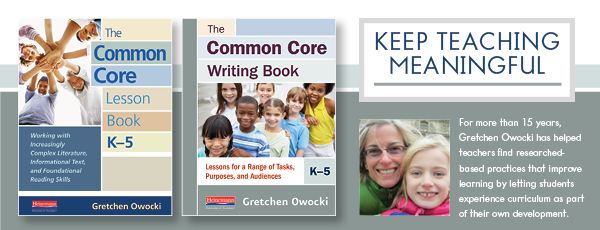Gretchen has long advocated for teachers as decision makers. Her belief is that teachers collaborating within and across grade levels are the best organizers and developers of their own curriculum. When they have the freedom to do it, they can do it well. Grechen Owocki is the author of The Common Core Lesson Book K–5, The Common Core Writing Book K–5, The Common Core Reading Book 6–8, and The RTI Daily Planning Book K–6.
Gretchen has long advocated for teachers as decision makers. Her belief is that teachers collaborating within and across grade levels are the best organizers and developers of their own curriculum. When they have the freedom to do it, they can do it well. Grechen Owocki is the author of The Common Core Lesson Book K–5, The Common Core Writing Book K–5, The Common Core Reading Book 6–8, and The RTI Daily Planning Book K–6.
“Good teaching is good teaching, whichever standards are formulated. What teachers do with the standards makes the difference.”
Today’s blog post is adapted from the shared introduction of Gretchen Owocki’s books The Common Core Lesson Book K–5 and The Common Core Writing Book K–5. Limited time savings on these CCSS resources! Scroll to the bottom for more information.

At the crossroads created by the Common Core State Standards, there are many paths we could take. Because effective teaching does not emerge from a set of standards, a mandate, a state office, or a manual, we must avoid paths that cast educators as secondary decision makers or that offer quick solutions or static packages. Effective teaching results from the skillful weaving of curriculum, carefully selected instructional practices, and thoughtful responses to children’s daily activity. Therefore, we must use this crossroads as an opportunity for educators to focus on teaching—and on improving teaching—to meet this new set of standards that has raised the expectations for student learning higher than ever.
School and district teams can start by implementing the most promising practices known to date, and these books are designed to support this effort. The instrumental practices you will find have been used effectively by many teachers; here they are altered and redesigned with special attention to the CCSS. Of course, we can’t just implement these practices without also watching our students. Along with teaching practices you will find support for observing students and collecting data to improve and fine tune your instruction. It is recommended that planned observation be initiated with each new lesson taught; with each new day; with each new unit or theme. Effective teaching involves taking note of children’s knowledge and responses to instruction and actively responding in light of both.
As we shape the new system and work within it, we must take care to not lose sight of meaningful teaching and learning. In working toward the new standards, kids are going to be doing hard things. We can still offer them a choice, opportunities to experience the pleasure of reading text they see as good, and they can still write for reasons that matter. We need not let standards or standardized testing take away from what we do well in classrooms or compel us to change our teaching so that students spend their school days practicing for tests, studying isolated skills, or sitting hunched over piles of work. Aiming for students to perform well doesn’t mean that we must abandon our work toward a meaningful curriculum. Within the new system, teachers who have managed to “get it right” with reading and writing can still implement instructional practices that foster deep and engaged reading, and allow students to write for authentic reasons. These goals are not inconsistent with the goals of the Common Core State Standards— and in fact having them in place will strengthen our work with the standards. We must home in on carefully selected formative assessments that allow us to understand what each child needs in order to grow as readers and writers.
But as we consider the new standards, the time is ripe for improvement. The time is ripe to consider ways to shift and alter our practices, and to weed out practices that are not conducive to meaningful learning. Not all teachers have a plan in place for observing students and shaping and differentiating their instruction based on actual classroom observations. Not all teachers have a system in place for collaborating with other teachers and staying in tune with new findings in the field. There is work to be done. These books can help.
By including all reproducible forms, charts, checklists and more, Gretchen Owocki has created a one-stop resource for every classroom that can help make a difference now. Whether you turn to these books to enhance your current curriculum or to design your own, Gretchen’s resources encourage teachers to consider the standards in light of their students and their curriculum and to choose instructional areas that warrant development at this point in time. She offers specific strategies and ideas for enhancing good work already being done, or developing curriculum in areas currently receiving little attention.
Use Code CORE15 for special pricing on The Common Core Lesson Book and The Common Core Writing Book through January 31, 2015.
Learn more about The Common Core Lesson Book K–5 and view sample chapter here.
Learn more about The Common Core Writing Book K–5 and view sample chapter here.


